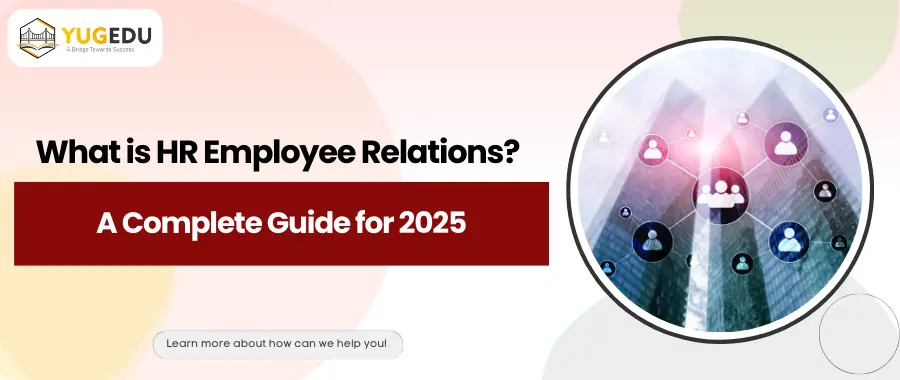
What is HR Employee Relations? A Complete Guide for 2025
In 2025, as workplaces continue evolving with hybrid models, AI integrations, and diverse workforces, the concept of HR Employee Relations is more relevant than ever. At its core, Employee Relations (ER) is about managing the relationship between employers and employees to maintain a healthy, productive, and engaging work environment. But in today's context, it goes far beyond resolving workplace conflicts or enforcing policies building trust, enhancing employee experience, and aligning people practices with organizational goals.
Whether you’re an aspiring HR professional, a manager looking to improve team dynamics, or a student exploring career paths, this guide will walk you through everything you need to know about HR Employee Relations in 2025.
What is HR Employee Relations?
HR Employee Relations (ER) is the practices, strategies, and policies organizations adopt to manage employer-employee relationships. It is concerned with maintaining a positive work environment, resolving disputes, compliance with labour laws, and improving employee satisfaction and productivity.
In 2025, Employee Relations is not merely about grievance handling or conducting exit interviews it's about proactive engagement, policy-making based on empathy, and building a fair, inclusive, and respectful workplace.
Why is Employee Relations Important?
Here’s why Employee Relations is important in today’s workplaces:
- Reduces Workplace Conflicts: Clear ER policies help prevent misunderstandings and tensions.
- Improves Employee Engagement: Open communication builds trust and motivates employees.
- Enhances Retention: When employees feel heard and respected, they’re more likely to stay.
- Ensures Legal Compliance: Proper ER practices minimize legal risks and ensure labour law adherence.
- Drives Organizational Culture: A strong ER strategy can shape a culture of transparency and collaboration.
Key Responsibilities in HR Employee Relations
Employee Relations professionals juggle many roles. Some of the key duties are:
- Policy Development & Implementation: Developing and maintaining equitable workplace policies, such as disciplinary procedures, leave policies, and workplace behaviour rules.
- Conflict Resolution & Mediation: Facilitating resolution of employee-to-employee or employee-to-management conflicts with tact and impartiality.
- Employee Grievances Handling: Creating a safe, confidential arena for employees to express complaints and ensuring timely resolution.
- Compliance with Labor Laws: Tracking evolving employment regulations such as workplace safety, wages, and discrimination and revising internal policies accordingly.
- Employee Engagement Initiatives: Creating plans for employee feedback, surveys, wellness programs, and recognition.
Skills Needed for a Career in Employee Relations
If you’re planning to build a career in this field, here are some crucial skills you should develop:
- Strong Communication: You must be able to clearly express policies, handle sensitive conversations, and write formal documents professionally.
- Empathy and Active Listening: Understanding employee concerns and making them feel heard is key to building trust and resolving issues effectively.
- Negotiation and Mediation: You’ll often mediate conflicts, so being able to find fair, balanced solutions that satisfy all parties is essential.
- Problem-solving Mindset: Every case is unique. You’ll need to think critically and make decisions that align with both employee well-being and company policy.
- Understanding of Employment Law: Knowing labour laws and regulations helps ensure fairness and protects the organization from legal risks.
- Confidentiality and Ethics: Handling sensitive information with discretion is a must. Ethical conduct builds credibility and employee confidence.
Courses that can be Purused
To get into HR Employee Relations in 2025, you can pursue:
- Bachelor’s Degree in Human Resource Management, Business, or Psychology
- Online Certifications in Employee Relations or Employment Law
- Master’s in Human Resource Management or Labor Relations (optional but valuable)
- Short-term courses on Conflict Management, Labor Law, and Diversity & Inclusion
Career Roles in Employee Relations
Some of the most common roles in this domain include:
- Employee Relations Specialist
- HR Business Partner (with ER responsibilities)
- Labor Relations Manager
- HR Generalist with ER focus
- Compliance and Ethics Officer
Trends Shaping Employee Relations in 2025
Modern ER is more strategic than ever. Here's what’s changing:
- AI-Driven Feedback Tools: Smart tools analyze employee sentiments to catch issues early.
- Hybrid Work Policies: Fair treatment for remote and in-office employees is a hot topic.
- Mental Health Focus: Employee wellness is now central to ER strategies.
- Diversity, Equity, and Inclusion (DEI): ER teams play a huge role in building inclusive workplaces.
- Transparent Communication: Employees expect honesty and involvement in decision-making.
How to Build Strong Employee Relations in Your Organization
Whether you're in HR or leadership, here’s how to create a positive ER environment:
- Encourage open-door policies
- Conduct regular check-ins and surveys
- Offer training on unconscious bias and communication
- Recognize and reward employee efforts
- Stay updated with local and global labour laws
- Treat employee feedback as a valuable asset
Universities Offering HR Employee Relations
Here are some Indian universities that offer courses or specializations in HR Employee Relations:
- Tata Institute of Social Sciences (TISS), Mumbai
- XLRI – Xavier School of Management, Jamshedpur
- Delhi School of Economics (University of Delhi)
- Symbiosis Institute of Business Management (SIBM), Pune
- Indian Institute of Management (IIM) – various campuses
- University of Madras – Department of Management Studies
- Osmania University, Hyderabad
- IGNOU (Indira Gandhi National Open University)
- Punjab University, Chandigarh
- Annamalai University, Tamil Nadu
Conclusion
Employee Relations is not just a back-end HR function anymore it's a strategic cornerstone of organizational success in 2025. As workplaces become more dynamic, inclusive, and employee-centric, HR teams must be the champions of ER practices that embody empathy, legal acumen, and effective communication. Whether you're constructing a career in ER or seeking to enhance your company culture, investing in good employee relations is a win-win for all concerned.





